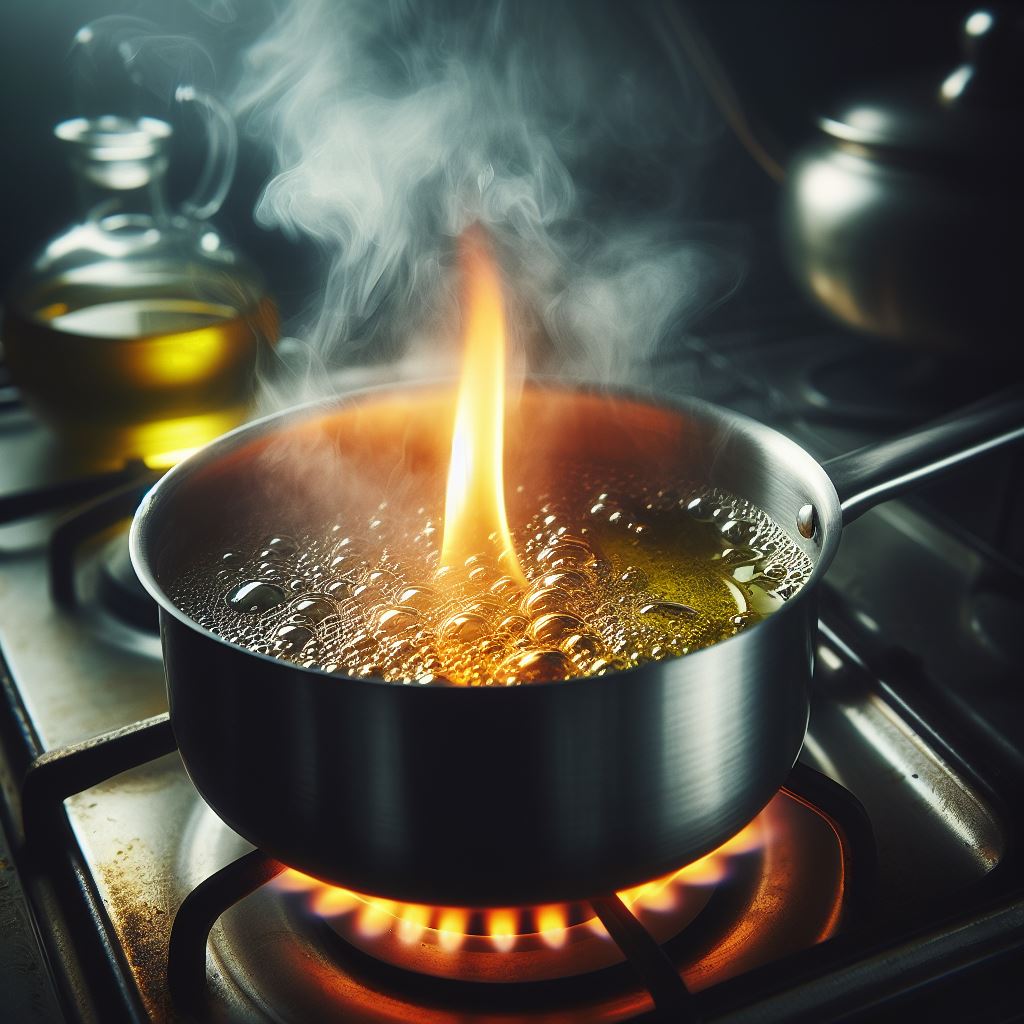Many cookbooks and celebrity chefs on television have cautioned against using olive oil (and especially extra-virgin olive oil) in high-temperature cooking. They complain that the smoke point of the oil is too low at only 375 degrees Fahrenheit (and isn’t much higher for refined olive oil), and that smoked oil is bad.
However, what exactly is smoking, and what are the most serious consequences of doing so? Though all oils are, molecularly speaking, fats, those fats themselves are formed of molecular chains called fatty acids.
Most of those fatty acids are attached to glycerol molecules to create fat, but every oil contains some free-floating fatty acids unbound by atomic or social convention.
Quick Overview – What Happens To Olive Oil At High Heat
| Consequences of Exposing Olive Oil to High Heat | Description |
|---|---|
| Smoking in Olive Oil | – Rapid occurrence in a hot pan due to high smoke point – Indicates potential breakdown of the oil – Requires additional oil to prevent further breakdown – Prolonged exposure leads to a rancid smell |
| Breakdown of Olive Oil | Two main outcomes: 1) The oil becomes rancid 2) Release of volatile compounds contributing to flavor and aroma – Rancidity detected through smell and color tests – Undesirable off-flavors and odors develop |
| Oxidation Process | – Triggered by heating olive oil over high heat – Accelerated in the presence of increased oxygen – Results in off-flavors and odors due to oxidation – Continues even after the oil cools down if left in the pan – Further oxidation occurs at room temperature over time |
| Prevention Measures | – Crucial to avoid direct sunlight, extreme heat, and air currents – Store olive oil in a sealed container to limit contact with oxygen |
| Health Risks | – Exposure to high heat forms toxic polar compounds – Linked to significant health issues such as Alzheimer’s and Parkinson’s – Permissible upper limit for polar molecules in frying oil: 24-27% – Lower levels recommended for fried items stored before consumption |
What happens to olive oil in a hot pan?

The short answer: It burns.
Olive oil has a very high smoke point, which means that it will burn before it starts to break down. That’s why when you put olive oil into a hot pan, it immediately starts smoking.
But what does that mean? Well, it means that you’re going to have to add more oil to the pan later on. If you don’t, the oil will start breaking down and turning rancid. And once it gets rancid, it won’t smell good anymore.
What happens to olive oils when they get too hot?
When you heat up olive oil, two things happen:
1) The oil breaks down and becomes rancid.
2) The oil smokes.
If you’ve ever had an old bottle of extra virgin olive oil sitting around, chances are it smells pretty bad. That’s because the oil has become rancid. So how do you know if your oil is rancid? There are several ways to test it.
Here are some common tests:
Smell Test
Put a few drops of your oil onto a paper towel or napkin. Then place the paper towel or napkin near your nose. Does it smell like olives? If yes, then your oil is probably still okay. If no, then it’s definitely rancid.
Color Test
You can also check the color of your oil by placing a small amount of it on a white plate. If it turns dark greenish yellow, then it’s likely rancid. You can also try adding a drop of food coloring to the oil. If it changes colors, then it’s rancid.
Why is it important to keep your olive oil from getting too hot?
Because when you heat up olive oil over high heat, it begins to break down and turn rancid. This process is called oxidation. Oxidation occurs naturally in the presence of oxygen. When you heat up olive oil in a pan, you increase the amount of oxygen present.
As a result, the oil oxidizes faster. And since oxidation leads to rancidity, you’ll end up with a lot of off-flavors and odors.
This is especially true if you leave the oil in the pan after heating it. Once the oil cools down, it will continue to oxidize. And if you let the oil sit at room temperature for a while, even more oxidation will occur.
So how do we prevent this from happening? We need to make sure that the oil doesn’t come into contact with oxygen. To do this, we need to store the oil in a sealed container.
Why does olive oil smoke at high temperatures?
When you heat up olive oil, it releases volatile compounds. These compounds include things like alcohols, aldehydes, ketones, esters, acids, and terpenes. These chemicals give the oil its flavor and aroma. And they’re what makes olive oil so delicious.
But these same chemicals are also responsible for the smoky odor. So when you heat up olive oils, those volatile compounds start releasing. But not all of them. Some of them are very reactive.
They tend to react with other molecules in the oil. In particular, they tend to react to each other. As a result, some of the compounds get trapped inside the oil. And others escape into the surrounding air.
What happens if Olive oil gets exposed to high heat?
Toxic byproducts termed polar compounds are formed when cooking oils are heated in the presence of air. These chemicals have been connected to the development of significant health issues such as Alzheimer’s and Parkinson’s.
Depending on their chemical composition, some oils can withstand higher temperatures than others. The Australian scientists highlighted that the permissible upper limit for polar molecules in frying oil is between 24 and 27 percent.
They added, however, that the levels should be significantly lower in fried items that have been stored for a while before being eaten.
Frequently Asked Questions (FAQs)
Q1: What is smoking in the context of olive oil, and what are the consequences of it happening?
A: Smoking in olive oil occurs when it reaches its smoke point during high-temperature cooking. The consequences include the breakdown of the oil, turning it rancid. This not only affects the flavor but also necessitates adding more oil to prevent further breakdown.
Q2: What happens to olive oil in a hot pan, and why does it start smoking immediately?
A: When olive oil is heated in a hot pan, it burns due to its high smoke point. This rapid smoking indicates that the oil is reaching its temperature limit, prompting the need for additional oil. Failure to do so may lead to the oil breaking down and becoming rancid.
Q3: How do you know if olive oil has become rancid after being exposed to high heat?
A: To check for rancidity, you can perform a smell test by placing a few drops on a paper towel and smelling it. If it doesn’t smell like olives, it’s likely rancid. Another method is the color test; if the oil turns dark greenish yellow, it has likely become rancid.
Q4: Why is it crucial to prevent olive oil from getting too hot during cooking?
A: Heating olive oil to high temperatures accelerates oxidation, leading to rancidity. Oxidation occurs faster in the presence of oxygen, which is increased during cooking. Storing olive oil in a sealed container helps prevent contact with oxygen and preserves its quality.
Q5: What chemicals are released when olive oil is heated, and what happens if it gets exposed to high heat?
A: Heating olive oil releases volatile compounds such as alcohols, aldehydes, ketones, esters, acids, and terpenes, contributing to its flavor and aroma. Exposure to high heat can lead to the formation of toxic polar compounds, associated with health issues like Alzheimer’s and Parkinson’s. Proper storage is crucial to mitigate these risks.
Conclusion
High temperatures can cause oils to break down and become rancid. This means that if you want to use extra virgin olive oil for cooking, you’ll need to keep it away from direct sunlight, extreme heat, and air currents. However, if you store it properly, you won’t have to worry too much about these issues.

Meet our air fryer recipe expert, Jenny J. Brown. Jenny is a culinary enthusiast with a passion for creating healthy, delicious meals using the latest kitchen appliances. As an experienced home cook and food blogger, Jenny has spent years experimenting with air fryer recipes and perfecting her techniques to create meals that are both nutritious and satisfying.

